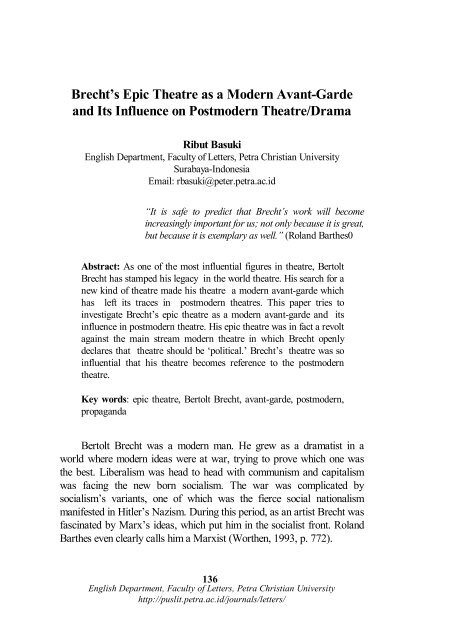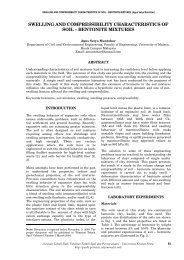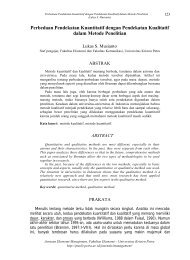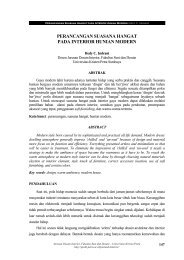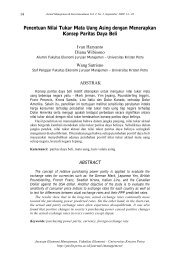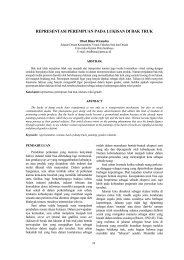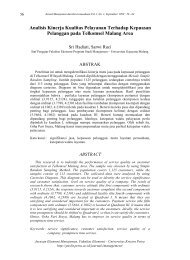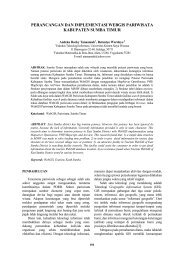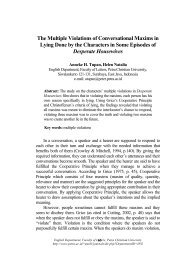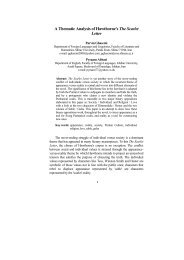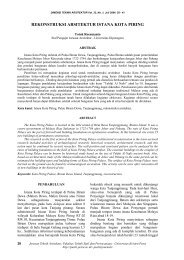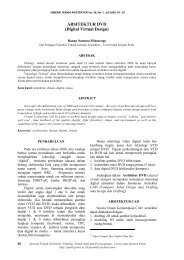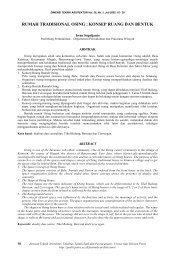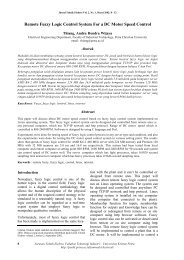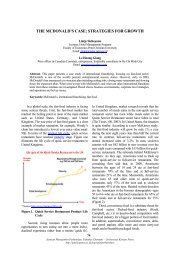Brecht's Epic Theatre as a Modern Avant-Garde and Its Influence on ...
Brecht's Epic Theatre as a Modern Avant-Garde and Its Influence on ...
Brecht's Epic Theatre as a Modern Avant-Garde and Its Influence on ...
Create successful ePaper yourself
Turn your PDF publications into a flip-book with our unique Google optimized e-Paper software.
Brecht’s <str<strong>on</strong>g>Epic</str<strong>on</strong>g> <str<strong>on</strong>g>Theatre</str<strong>on</strong>g> <str<strong>on</strong>g>as</str<strong>on</strong>g> a <str<strong>on</strong>g>Modern</str<strong>on</strong>g> <str<strong>on</strong>g>Avant</str<strong>on</strong>g>-<str<strong>on</strong>g>Garde</str<strong>on</strong>g><br />
<str<strong>on</strong>g>and</str<strong>on</strong>g> <str<strong>on</strong>g>Its</str<strong>on</strong>g> <str<strong>on</strong>g>Influence</str<strong>on</strong>g> <strong>on</strong> Postmodern <str<strong>on</strong>g>Theatre</str<strong>on</strong>g>/Drama<br />
Ribut B<str<strong>on</strong>g>as</str<strong>on</strong>g>uki<br />
English Department, Faculty of Letters, Petra Christian University<br />
Surabaya-Ind<strong>on</strong>esia<br />
Email: rb<str<strong>on</strong>g>as</str<strong>on</strong>g>uki@peter.petra.ac.id<br />
“It is safe to predict that Brecht’s work will become<br />
incre<str<strong>on</strong>g>as</str<strong>on</strong>g>ingly important for us; not <strong>on</strong>ly because it is great,<br />
but because it is exemplary <str<strong>on</strong>g>as</str<strong>on</strong>g> well.” (Rol<str<strong>on</strong>g>and</str<strong>on</strong>g> Barthes0<br />
Abstract: As <strong>on</strong>e of the most influential figures in theatre, Bertolt<br />
Brecht h<str<strong>on</strong>g>as</str<strong>on</strong>g> stamped his legacy in the world theatre. His search for a<br />
new kind of theatre made his theatre a modern avant-garde which<br />
h<str<strong>on</strong>g>as</str<strong>on</strong>g> left its traces in postmodern theatres. This paper tries to<br />
investigate Brecht’s epic theatre <str<strong>on</strong>g>as</str<strong>on</strong>g> a modern avant-garde <str<strong>on</strong>g>and</str<strong>on</strong>g> its<br />
influence in postmodern theatre. His epic theatre w<str<strong>on</strong>g>as</str<strong>on</strong>g> in fact a revolt<br />
against the main stream modern theatre in which Brecht openly<br />
declares that theatre should be ‘political.’ Brecht’s theatre w<str<strong>on</strong>g>as</str<strong>on</strong>g> so<br />
influential that his theatre becomes reference to the postmodern<br />
theatre.<br />
Key words: epic theatre, Bertolt Brecht, avant-garde, postmodern,<br />
propag<str<strong>on</strong>g>and</str<strong>on</strong>g>a<br />
Bertolt Brecht w<str<strong>on</strong>g>as</str<strong>on</strong>g> a modern man. He grew <str<strong>on</strong>g>as</str<strong>on</strong>g> a dramatist in a<br />
world where modern ide<str<strong>on</strong>g>as</str<strong>on</strong>g> were at war, trying to prove which <strong>on</strong>e w<str<strong>on</strong>g>as</str<strong>on</strong>g><br />
the best. Liberalism w<str<strong>on</strong>g>as</str<strong>on</strong>g> head to head with communism <str<strong>on</strong>g>and</str<strong>on</strong>g> capitalism<br />
w<str<strong>on</strong>g>as</str<strong>on</strong>g> facing the new born socialism. The war w<str<strong>on</strong>g>as</str<strong>on</strong>g> complicated by<br />
socialism’s variants, <strong>on</strong>e of which w<str<strong>on</strong>g>as</str<strong>on</strong>g> the fierce social nati<strong>on</strong>alism<br />
manifested in Hitler’s Nazism. During this period, <str<strong>on</strong>g>as</str<strong>on</strong>g> an artist Brecht w<str<strong>on</strong>g>as</str<strong>on</strong>g><br />
f<str<strong>on</strong>g>as</str<strong>on</strong>g>cinated by Marx’s ide<str<strong>on</strong>g>as</str<strong>on</strong>g>, which put him in the socialist fr<strong>on</strong>t. Rol<str<strong>on</strong>g>and</str<strong>on</strong>g><br />
Barthes even clearly calls him a Marxist (Worthen, 1993, p. 772).<br />
136<br />
English Department, Faculty of Letters, Petra Christian University<br />
http://puslit.petra.ac.id/journals/letters/
B<str<strong>on</strong>g>as</str<strong>on</strong>g>uki, Brecht’s <str<strong>on</strong>g>Epic</str<strong>on</strong>g> <str<strong>on</strong>g>Theatre</str<strong>on</strong>g> <str<strong>on</strong>g>as</str<strong>on</strong>g> a <str<strong>on</strong>g>Modern</str<strong>on</strong>g> <str<strong>on</strong>g>Avant</str<strong>on</strong>g>-<str<strong>on</strong>g>Garde</str<strong>on</strong>g><br />
Brecht, however, although a Marxist <str<strong>on</strong>g>and</str<strong>on</strong>g> clearly anti-capitalist, did<br />
not actually bel<strong>on</strong>g in either of the competing parties. In the rivalry of<br />
cl<str<strong>on</strong>g>as</str<strong>on</strong>g>ses between the capitalist bourgeoisie <str<strong>on</strong>g>and</str<strong>on</strong>g> the socialist proletariat, he<br />
w<str<strong>on</strong>g>as</str<strong>on</strong>g> in favor of the proletariat. Nevertheless, he w<str<strong>on</strong>g>as</str<strong>on</strong>g> not actually “a<br />
member of the proletariat fighting for the interest of his social cl<str<strong>on</strong>g>as</str<strong>on</strong>g>s, but<br />
rather a self-exiled member of the bourgeoisie” (Bremer, 1976, p. 1). In<br />
his journal written when he w<str<strong>on</strong>g>as</str<strong>on</strong>g> in exile in Denmark he wrote, “ I greatly<br />
like the proletariat belief in its final victory. But the proletariat closely<br />
c<strong>on</strong>nected belief in various other things it h<str<strong>on</strong>g>as</str<strong>on</strong>g> been told, I find disturbing”<br />
(Brecht,1993, p. 6). He had an antibourgeois attitude because of his deep<br />
disappointment in his society’s civilizati<strong>on</strong> after World War I. He agreed<br />
with Marx that it w<str<strong>on</strong>g>as</str<strong>on</strong>g> the capitalist that created the ‘decadent’ society.<br />
However, after World War II, although he shared the same b<str<strong>on</strong>g>as</str<strong>on</strong>g>ic Marxist<br />
ideology with the communist party, he often had disagreements with<br />
them. Brecht, says Willet, “w<str<strong>on</strong>g>as</str<strong>on</strong>g> not the kind of figure who fitted all that<br />
e<str<strong>on</strong>g>as</str<strong>on</strong>g>y into any grouping” (Brecht, 1992, xi). As an artist, therefore, Brecht<br />
did not serve any political “party.” His aesthetics w<str<strong>on</strong>g>as</str<strong>on</strong>g> anti-Aristotelian<br />
dramatic theatre, but it also “cl<str<strong>on</strong>g>as</str<strong>on</strong>g>hed with the (communist) aesthetics of<br />
social realism” (Hubner, 1992, p. 139). He went to a different cutting<br />
edge <str<strong>on</strong>g>and</str<strong>on</strong>g> developed his aesthetics with c<strong>on</strong>tinuous experiments.<br />
Brecht’s theatre--which is known <str<strong>on</strong>g>as</str<strong>on</strong>g> epic-theatre--, w<str<strong>on</strong>g>as</str<strong>on</strong>g> clearly an<br />
avant-garde. In fact it h<str<strong>on</strong>g>as</str<strong>on</strong>g> been c<strong>on</strong>sidered <str<strong>on</strong>g>as</str<strong>on</strong>g> <strong>on</strong>e of the most important<br />
<str<strong>on</strong>g>and</str<strong>on</strong>g> influential modern avant-garde theatres. His aesthetics h<str<strong>on</strong>g>as</str<strong>on</strong>g> c<strong>on</strong>tinued<br />
to influence theatre until the present day, when the school of thought h<str<strong>on</strong>g>as</str<strong>on</strong>g><br />
shifted from modernism to postmodernism. In this paper I shall examine<br />
how Brecht’s epic theatre influences postmodern theatres. To do so, first<br />
of all, I will review how Brecht’s epic theatre is c<strong>on</strong>sidered a modern<br />
avant-garde. Then, I shall examine the ide<str<strong>on</strong>g>as</str<strong>on</strong>g> in his epic theatre that<br />
initiate the birth of postmodern theatres.<br />
EPIC THEATRE AS A MODERN AVANT-GARDE<br />
Brecht’s epic theatre developed in a political upheaval. Elin<br />
Diam<strong>on</strong>d noted that his theory w<str<strong>on</strong>g>as</str<strong>on</strong>g> written over 30-year periode<br />
(Worthen, 1993, p. 1284), ranging from pre- to post-World War II. To<br />
underst<str<strong>on</strong>g>and</str<strong>on</strong>g> it we need to review its historical background before<br />
examining its theoretical foundati<strong>on</strong>: the b<str<strong>on</strong>g>as</str<strong>on</strong>g>ic philosophy of epic theatre.<br />
English Department, Faculty of Letters, Petra Christian University<br />
http://puslit.petra.ac.id/journals/letters/<br />
137
138<br />
VOLUME 4, NUMBER 2, DECEMBER 2002: 135-147<br />
Rol<str<strong>on</strong>g>and</str<strong>on</strong>g> Barthes (in Worthen, 1993, p. 772) wrote, “to separate Brechtian<br />
theatre from its theoretical foundati<strong>on</strong> would be ... err<strong>on</strong>eous ....”<br />
Examining its b<str<strong>on</strong>g>as</str<strong>on</strong>g>ic philosophy brings us to the underst<str<strong>on</strong>g>and</str<strong>on</strong>g>ing of <str<strong>on</strong>g>Epic</str<strong>on</strong>g><br />
theatre’s c<strong>on</strong>tent. We will finally see how the c<strong>on</strong>tent finally leads to the<br />
development of its form.<br />
<str<strong>on</strong>g>Theatre</str<strong>on</strong>g> w<str<strong>on</strong>g>as</str<strong>on</strong>g> highly related to politics during Germany’s political<br />
warfare. This close relati<strong>on</strong>ship is due to the fact that theatre is a very<br />
effective media to gain influence. <str<strong>on</strong>g>Theatre</str<strong>on</strong>g>, according to Hubner (1992),<br />
is distinguished from the other arts in that it is instituti<strong>on</strong>al <str<strong>on</strong>g>and</str<strong>on</strong>g> social in<br />
nature (p. 5). “These characteristics closely ally to politics, since they<br />
make it possible for theatre to be used <str<strong>on</strong>g>as</str<strong>on</strong>g> an instrument of propag<str<strong>on</strong>g>and</str<strong>on</strong>g>a”<br />
(pp. 5-6). The socialists were really aware of this idea. In fact, they<br />
“believed in the idea that theatre should serve society” (Gerould in<br />
Hubner, 1992). C<strong>on</strong>sequently, c<strong>on</strong>sidering that the popular “bourgeois”<br />
realism carried the ide<str<strong>on</strong>g>as</str<strong>on</strong>g> of capitalism, efforts were made by “the<br />
revoluti<strong>on</strong>aries” to battle such theatres.<br />
Before Hitler came to power in 1933, there were at le<str<strong>on</strong>g>as</str<strong>on</strong>g>t two<br />
dominant theatre ideologies in Germany that were against (western)<br />
bourgeois realism: the social realism <str<strong>on</strong>g>and</str<strong>on</strong>g> the emerging cult (Nazi’s)<br />
theatre. These two ideologies at first looked alike in that they worked for<br />
the revoluti<strong>on</strong>. They all had influential theatre figures who made<br />
“experiments” to develop a new kind of theatre. “The avant-garde artists<br />
were denounced <str<strong>on</strong>g>as</str<strong>on</strong>g> ‘breeders’ of the proletarian world revoluti<strong>on</strong>”<br />
(Zortman, 1984, p. 2). Brecht w<str<strong>on</strong>g>as</str<strong>on</strong>g> supposedly <strong>on</strong>e of them. However,<br />
since 1927 Hitler’s Nati<strong>on</strong>al Socialist Party began to develop their own<br />
kind of theatre, cult theatre, which w<str<strong>on</strong>g>as</str<strong>on</strong>g> used to develop the idea of<br />
Germany’s ‘pure’ <str<strong>on</strong>g>and</str<strong>on</strong>g> ‘genuine’ culture (Zortman, 1984, p. 1). This<br />
party “intended not <strong>on</strong>ly to curb the tide of bourgeois cultural dominance<br />
but (also) to annihilate it” (p. 16).<br />
This cult theatre reached its peak when Nazi ruled the country.<br />
“When Hitler came to power, the German theatre w<str<strong>on</strong>g>as</str<strong>on</strong>g> flourishing, with<br />
numerous w<strong>on</strong>derful buildings <str<strong>on</strong>g>and</str<strong>on</strong>g> high artistic level <str<strong>on</strong>g>as</str<strong>on</strong>g>sured by a<br />
nucleus of outst<str<strong>on</strong>g>and</str<strong>on</strong>g>ing directors <str<strong>on</strong>g>and</str<strong>on</strong>g> actors” (Hubner, 1992, p. 90). This,<br />
however, did not benefit Brecht <str<strong>on</strong>g>and</str<strong>on</strong>g> his friends since they were just empty<br />
propag<str<strong>on</strong>g>and</str<strong>on</strong>g>a in which creativity had to submit itself to political purposes.<br />
About this situati<strong>on</strong> Zortman (1984) comments <str<strong>on</strong>g>as</str<strong>on</strong>g> follows:<br />
English Department, Faculty of Letters, Petra Christian University<br />
http://puslit.petra.ac.id/journals/letters/
B<str<strong>on</strong>g>as</str<strong>on</strong>g>uki, Brecht’s <str<strong>on</strong>g>Epic</str<strong>on</strong>g> <str<strong>on</strong>g>Theatre</str<strong>on</strong>g> <str<strong>on</strong>g>as</str<strong>on</strong>g> a <str<strong>on</strong>g>Modern</str<strong>on</strong>g> <str<strong>on</strong>g>Avant</str<strong>on</strong>g>-<str<strong>on</strong>g>Garde</str<strong>on</strong>g><br />
Fettered by their extreme ideology, the Nazi could never appreciate<br />
that all artistic creativity spring from individual human inspirati<strong>on</strong>,<br />
… They could never apprehend that though he may criticize or even<br />
ridicule his culture, he b<str<strong>on</strong>g>as</str<strong>on</strong>g>ically respects even reveres that culture, if<br />
it is worthy, <str<strong>on</strong>g>and</str<strong>on</strong>g> thrives <strong>on</strong> his <str<strong>on</strong>g>as</str<strong>on</strong>g>sociati<strong>on</strong> with it by the bestowal of<br />
his talents” (p. 7).<br />
Aesthetically, Brecht suffered more since the Nazi “put a very<br />
definite stop to the development of such (epic <str<strong>on</strong>g>and</str<strong>on</strong>g> didactic) theatre”<br />
(Brecht in Worthen, 1993, p. 771). Brecht, being unable to work <str<strong>on</strong>g>and</str<strong>on</strong>g><br />
having a Jewish wife, chose to avoid Hitler by living in other countries<br />
(starting from Denmark) where he c<strong>on</strong>tinued to work <strong>on</strong> the epic theatre.<br />
After World War II, in 1948, Brecht went back to Berlin (E<str<strong>on</strong>g>as</str<strong>on</strong>g>t<br />
Germany). However, although living in a country with Marxist ideology,<br />
he w<str<strong>on</strong>g>as</str<strong>on</strong>g> not really welcome. Brecht’s epic theatre had to face the socialist<br />
realism. “Brecht’s staging w<str<strong>on</strong>g>as</str<strong>on</strong>g> accused of symbolism <str<strong>on</strong>g>and</str<strong>on</strong>g> naturalism at<br />
<strong>on</strong>e <str<strong>on</strong>g>and</str<strong>on</strong>g> the same time, or still worse of not fitting within the norms of<br />
uniform socialist-realist art with its simplified didacticism <str<strong>on</strong>g>and</str<strong>on</strong>g><br />
idealizati<strong>on</strong> of reality” (Hubner, 1992, p. 139). This is because even<br />
though Brecht had relatively the same ideology with the socialist-realist,<br />
he had a different approach to Marxism.<br />
Unlike the socialist-realist, although his theatre w<str<strong>on</strong>g>as</str<strong>on</strong>g> also political in<br />
nature, Brecht’s experiments with epic theatre were not primarily meant<br />
to gain power. With some other Germany’s avant-garde artists, Brecht<br />
started from the fact that “(early) in the nineteenth century theatre w<str<strong>on</strong>g>as</str<strong>on</strong>g><br />
syn<strong>on</strong>ymous with the cheapest <str<strong>on</strong>g>and</str<strong>on</strong>g> artistically most dubious form of<br />
entertainment. This state of affairs spurred into acti<strong>on</strong> socially c<strong>on</strong>scious<br />
individuals who decided that they must provide the m<str<strong>on</strong>g>as</str<strong>on</strong>g>ses with<br />
artistically worthwhile theatre” (Hubner, 1992, p. 106). Brecht did want<br />
to see his society change, but he w<str<strong>on</strong>g>as</str<strong>on</strong>g> not involved in the proletariat’s<br />
effort to rule the country.<br />
To Hubner, Brecht’s theatre differed from socialist-realist theatre in<br />
that Brecht’s w<str<strong>on</strong>g>as</str<strong>on</strong>g> agitati<strong>on</strong> theatre, while the socialist-realist’s w<str<strong>on</strong>g>as</str<strong>on</strong>g> a<br />
propag<str<strong>on</strong>g>and</str<strong>on</strong>g>a theatre. “Propag<str<strong>on</strong>g>and</str<strong>on</strong>g>a embellishes reality; agitati<strong>on</strong> wants to<br />
change it” (Hubner, 1992, p. 139). Hubner c<strong>on</strong>tends that Brecht’s<br />
aesthetics got its root in 1920s under the distinct influence of Piscator <str<strong>on</strong>g>and</str<strong>on</strong>g><br />
agitati<strong>on</strong>al theatre (p. 139). Szanto (1978), however, sees it differently.<br />
English Department, Faculty of Letters, Petra Christian University<br />
http://puslit.petra.ac.id/journals/letters/<br />
139
140<br />
VOLUME 4, NUMBER 2, DECEMBER 2002: 135-147<br />
He believes that all theatre is propag<str<strong>on</strong>g>and</str<strong>on</strong>g>istic (p. 72). “The play<br />
propag<str<strong>on</strong>g>and</str<strong>on</strong>g>izes an ideology without an awareness <strong>on</strong> the part of the<br />
playwright or of the producti<strong>on</strong> that the presentati<strong>on</strong> is implicitly laden<br />
with values which the play is propag<str<strong>on</strong>g>and</str<strong>on</strong>g>izing” (Szanto, 1978, p. 73). To<br />
Szanto, even Aeschylus’s or Shakespeare’s plays c<strong>on</strong>tain propag<str<strong>on</strong>g>and</str<strong>on</strong>g>a!<br />
Szanto categorizes theatre’s propag<str<strong>on</strong>g>and</str<strong>on</strong>g>a into three: agitati<strong>on</strong><br />
propag<str<strong>on</strong>g>and</str<strong>on</strong>g>a, integrati<strong>on</strong> propag<str<strong>on</strong>g>and</str<strong>on</strong>g>a, <str<strong>on</strong>g>and</str<strong>on</strong>g> dialectical propag<str<strong>on</strong>g>and</str<strong>on</strong>g>a (p. 72).<br />
Quoting Jaques Ellul he says, “(agitati<strong>on</strong> propag<str<strong>on</strong>g>and</str<strong>on</strong>g>a) is most often<br />
subversive propag<str<strong>on</strong>g>and</str<strong>on</strong>g>a <str<strong>on</strong>g>and</str<strong>on</strong>g> h<str<strong>on</strong>g>as</str<strong>on</strong>g> stamp of oppositi<strong>on</strong>. It is led by a party<br />
seeking to destroy the government or the established order” (p. 73).<br />
Socialist-realism falls into the first category. Integrati<strong>on</strong> propag<str<strong>on</strong>g>and</str<strong>on</strong>g>a is “a<br />
self-producing propag<str<strong>on</strong>g>and</str<strong>on</strong>g>a that seeks to obtain stable behavior, to adapt<br />
the individual to his everyday life, to reshape his thoughts <str<strong>on</strong>g>and</str<strong>on</strong>g> behavior in<br />
terms of permanent social setting” (Ellul in Szanto, 1978, p. 74). “Bourgeois<br />
realism” bel<strong>on</strong>gs to this kind of propag<str<strong>on</strong>g>and</str<strong>on</strong>g>a.<br />
Brecht’s theatre, of course, falls into Szanto’s third category. This<br />
category, in his opini<strong>on</strong>, “is the most difficult theatre to create” (p. 75).<br />
About this kind of theatre he further says:<br />
It is a theatre which attempts to demystify, by depicting separately,<br />
interactively <str<strong>on</strong>g>and</str<strong>on</strong>g> always clearly, the b<str<strong>on</strong>g>as</str<strong>on</strong>g>ic elements which comprise<br />
a c<strong>on</strong>fused social or historical situati<strong>on</strong>. This is the science of<br />
dialectic materialism, …, brought to dramatic presentati<strong>on</strong>” (p. 75).<br />
Using Szanto’s view point we can finally see what Brecht’s theatre<br />
is about. We can now trace epic theatre’s b<str<strong>on</strong>g>as</str<strong>on</strong>g>ic philosophy (c<strong>on</strong>tent) <str<strong>on</strong>g>and</str<strong>on</strong>g><br />
its form.<br />
Using Guba & Lincoln’s frame (in Denzin & Lincoln, 1994, pp.<br />
105-117), we can say that <str<strong>on</strong>g>as</str<strong>on</strong>g> a Marxian theatre Brecht’s epic theatre<br />
views reality <str<strong>on</strong>g>as</str<strong>on</strong>g> follows:<br />
Ontology Historical realism—virtual reality shaped by social,<br />
political, cultural, ec<strong>on</strong>omic … value; crystallized over<br />
time.<br />
Epistemology knowledge (of reality) is value mediated <str<strong>on</strong>g>and</str<strong>on</strong>g> hence value<br />
dependent.<br />
Methodology dialectical<br />
English Department, Faculty of Letters, Petra Christian University<br />
http://puslit.petra.ac.id/journals/letters/
B<str<strong>on</strong>g>as</str<strong>on</strong>g>uki, Brecht’s <str<strong>on</strong>g>Epic</str<strong>on</strong>g> <str<strong>on</strong>g>Theatre</str<strong>on</strong>g> <str<strong>on</strong>g>as</str<strong>on</strong>g> a <str<strong>on</strong>g>Modern</str<strong>on</strong>g> <str<strong>on</strong>g>Avant</str<strong>on</strong>g>-<str<strong>on</strong>g>Garde</str<strong>on</strong>g><br />
‘Self’ in the epic theatre, therefore, is shaped by any dominant<br />
social/political/ cultural/ec<strong>on</strong>omic structures. No self is either natural or<br />
independent. Unlike in cl<str<strong>on</strong>g>as</str<strong>on</strong>g>sical plays—Greek plays especially--no<br />
suffering is natural: it is always related to “structures that c<strong>on</strong>strain <str<strong>on</strong>g>and</str<strong>on</strong>g><br />
exploit human kind” (Guba & Lincoln in Denzin & Lincoln, 1994, p.<br />
113). ‘Self’ is value dependent, unlike in the realist’s belief in which<br />
some<strong>on</strong>e can choose his own identity. One needs, first of all, to liberate<br />
himself/herself from the oppressing structure.<br />
Changing/liberating ‘self’ requires more than just psychological<br />
analysis. Brecht c<strong>on</strong>tends that there h<str<strong>on</strong>g>as</str<strong>on</strong>g> to be “a transformati<strong>on</strong> of<br />
psychological ‘c<strong>on</strong>flict’ into historical c<strong>on</strong>diti<strong>on</strong>” (Worthen, 1993, p.<br />
773) in theatre to liberate ‘self.’ To really underst<str<strong>on</strong>g>and</str<strong>on</strong>g> the historical<br />
c<strong>on</strong>diti<strong>on</strong> <str<strong>on</strong>g>and</str<strong>on</strong>g> to realize that a pers<strong>on</strong> is formed by the dominant value<br />
s/he h<str<strong>on</strong>g>as</str<strong>on</strong>g> adopted unc<strong>on</strong>sciously, a critical mind is needed. Therefore,<br />
neither the actor nor the spectator should be drawn into “simple empathy”<br />
(Brecht, 1992, p. 71), in which they usually try to identify themselves.<br />
In his explanati<strong>on</strong> about epic theatre, Brecht proposes that theatre<br />
should provide a process of alienati<strong>on</strong>: the alienati<strong>on</strong> that is necessary to<br />
all underst<str<strong>on</strong>g>and</str<strong>on</strong>g>ing (p. 71). Further, addressing the spectator Brecht gives a<br />
comparis<strong>on</strong> between dramatic theatre’s spectator <str<strong>on</strong>g>and</str<strong>on</strong>g> epic theatre’s<br />
spectator <str<strong>on</strong>g>as</str<strong>on</strong>g> follows:<br />
The dramatic theatre’s spectator says: Yes, I have felt like that<br />
too—Just like me—It’s <strong>on</strong>ly natural—It’ll never change—The<br />
suffering of this man appals me, because they are inescapable—<br />
That’s great art; it all seems the most obvious thing in the world—I<br />
weep when they weep, I laugh when they laugh.<br />
The epic theatre’s spectator says: I’d never have thought it—that’s<br />
not the way—That’s extraordinary, hardly believable—It’s got to<br />
stop—The sufferings of this man appal me, because they are<br />
unnecessary—That’s great art: nothing obvious in it—I laugh when<br />
they weep, I weep when they laugh (p. 71).<br />
To accommodate the c<strong>on</strong>tents, Brecht needed a new form.<br />
“Shakespeare’s great plays, the b<str<strong>on</strong>g>as</str<strong>on</strong>g>is of our drama, are no l<strong>on</strong>ger<br />
effective” (Brecht, 1992, p. 20). He said further that those works were<br />
followed by three centuries in which the individual developed into a<br />
English Department, Faculty of Letters, Petra Christian University<br />
http://puslit.petra.ac.id/journals/letters/<br />
141
142<br />
VOLUME 4, NUMBER 2, DECEMBER 2002: 135-147<br />
capitalist, <str<strong>on</strong>g>and</str<strong>on</strong>g> what killed them w<str<strong>on</strong>g>as</str<strong>on</strong>g> not capitalism’s c<strong>on</strong>sequences but<br />
capitalism itself (p. 20). A new form, therefore, w<str<strong>on</strong>g>as</str<strong>on</strong>g> to be developed; <str<strong>on</strong>g>and</str<strong>on</strong>g><br />
the birth of the epic theatre w<str<strong>on</strong>g>as</str<strong>on</strong>g> inevitable. How is the form like? Brecht’s<br />
table below gives a clear general explanati<strong>on</strong> about the form of the epic<br />
theatre:<br />
DRAMATIC THEATRE EPIC THEATRE<br />
plot narrative<br />
implicates the spectator in a stage turns the spectator into an observer,<br />
situati<strong>on</strong><br />
but<br />
wears down his capacity for acti<strong>on</strong> arouses his capacity for acti<strong>on</strong><br />
provide his with sensati<strong>on</strong> forces him to take decisi<strong>on</strong>s<br />
experience picture of the world<br />
the spectator is involved in he is made to face something<br />
something<br />
suggesti<strong>on</strong> argument<br />
instinctive feelings are preserved brought of the point of recogniti<strong>on</strong><br />
the spectator is in the thick of it, the spectator st<str<strong>on</strong>g>and</str<strong>on</strong>g>s outside, studies<br />
shares the experience<br />
the human being is taken for the human being is the object of the<br />
granted<br />
Inquiry<br />
he is unalterable he is alterable <str<strong>on</strong>g>and</str<strong>on</strong>g> able to alter<br />
eyes <strong>on</strong> the finish eyes <strong>on</strong> the course<br />
<strong>on</strong>e scene makes another each scene for itself<br />
growth m<strong>on</strong>tage<br />
linear development in curves<br />
evoluti<strong>on</strong>ary determinati<strong>on</strong> jumps<br />
man <str<strong>on</strong>g>as</str<strong>on</strong>g> a fixed point man <str<strong>on</strong>g>as</str<strong>on</strong>g> a process<br />
thought determines being social being determines thought<br />
feeling re<str<strong>on</strong>g>as</str<strong>on</strong>g><strong>on</strong><br />
(p. 37).<br />
We can readily see that the table answers <strong>on</strong>tological, epistemological<br />
<str<strong>on</strong>g>and</str<strong>on</strong>g> methodological questi<strong>on</strong>s about epic theatre. The<br />
c<strong>on</strong>tr<str<strong>on</strong>g>as</str<strong>on</strong>g>t between “thought determines being” <str<strong>on</strong>g>and</str<strong>on</strong>g> “social being<br />
determines thought,” for instance, is directly related to the <strong>on</strong>tological <str<strong>on</strong>g>and</str<strong>on</strong>g><br />
epistemological c<strong>on</strong>tr<str<strong>on</strong>g>as</str<strong>on</strong>g>t between positivism <str<strong>on</strong>g>and</str<strong>on</strong>g> Marxist critical theory.<br />
English Department, Faculty of Letters, Petra Christian University<br />
http://puslit.petra.ac.id/journals/letters/
B<str<strong>on</strong>g>as</str<strong>on</strong>g>uki, Brecht’s <str<strong>on</strong>g>Epic</str<strong>on</strong>g> <str<strong>on</strong>g>Theatre</str<strong>on</strong>g> <str<strong>on</strong>g>as</str<strong>on</strong>g> a <str<strong>on</strong>g>Modern</str<strong>on</strong>g> <str<strong>on</strong>g>Avant</str<strong>on</strong>g>-<str<strong>on</strong>g>Garde</str<strong>on</strong>g><br />
The table also clearly lists the characteristics of epic theatre’s form.<br />
<str<strong>on</strong>g>Epic</str<strong>on</strong>g> theatre uses narrative (not plot), episodic (not climactic) scenes,<br />
m<strong>on</strong>tage (not dramatic development), curves (not linear development),<br />
<str<strong>on</strong>g>and</str<strong>on</strong>g> scenes that jump (not cause <str<strong>on</strong>g>and</str<strong>on</strong>g> effect). These characteristics are<br />
needed <str<strong>on</strong>g>as</str<strong>on</strong>g> methodological tools to achieve the desired purposes. Since<br />
plot tends to draw the spectator into “the story,” Brecht introduces the<br />
use of narratives, in which the spectator <strong>on</strong>ly becomes an observer.<br />
Moreover, it is presented episodically with scenes that can jump to any<br />
places or time without the spectator’s anticipati<strong>on</strong>. This will make the<br />
spectator “expelled” from “the story” anytime s/he is drawn into it. Even<br />
more surprising, <str<strong>on</strong>g>as</str<strong>on</strong>g> a m<strong>on</strong>tage the scenes can be presented in a series of<br />
n<strong>on</strong>-linear scenes in which the spectator could not but think about what is<br />
going <strong>on</strong> <strong>on</strong> stage.<br />
The stage should also be set differently. Since the spectator is made<br />
aware that s/he sees a theatre, not representati<strong>on</strong> of life, Brecht argued<br />
that “it is… necessary to drop the <str<strong>on</strong>g>as</str<strong>on</strong>g>sumpti<strong>on</strong> that there is a forth wall<br />
cutting the audience off from the stage <str<strong>on</strong>g>and</str<strong>on</strong>g> the c<strong>on</strong>sequent illusi<strong>on</strong> that<br />
the stage acti<strong>on</strong> is taking place in reality <str<strong>on</strong>g>and</str<strong>on</strong>g> without audience” (Brecht,<br />
1992, p. 136). Curtain, therefore, is no l<strong>on</strong>ger useful. The spectator sees<br />
the set directly <str<strong>on</strong>g>as</str<strong>on</strong>g> s/he enters the theater. “<str<strong>on</strong>g>Theatre</str<strong>on</strong>g> remains theatre” he<br />
said (Worthen, 1993, p. 769), it’s not a ‘slice of life’ <strong>on</strong> stage.<br />
There is also the need of having a different acting style. This is<br />
needed to create “the alienati<strong>on</strong> effect, … to make the spectator adopt an<br />
attitude of inquiry <str<strong>on</strong>g>and</str<strong>on</strong>g> criticism in his approach to the incident” (Brecht,<br />
1992, p. 136). On stage the actor presents a character, not represent<br />
him/her. Brecht proposed, “The actor does not allow himself to become<br />
completely transformed <strong>on</strong> the stage into the character he is portraying.<br />
He is not Lear, Harpag<strong>on</strong>, Scheiwk; he shows them” (Brecht, 1992, p.<br />
137).<br />
Brecht wanted the spectator to think. <str<strong>on</strong>g>Theatre</str<strong>on</strong>g> is “an intellectual<br />
process” (Boal in Birringer, 1991, p. 14) to Brecht. He didn’t want the<br />
spectator to see life <strong>on</strong> stage, but to think about life. He wanted the<br />
spectator to see how the theatre “demystifies relati<strong>on</strong>ships between<br />
individuals <str<strong>on</strong>g>and</str<strong>on</strong>g> instituti<strong>on</strong>s, individuals <str<strong>on</strong>g>and</str<strong>on</strong>g> individuals, instituti<strong>on</strong>s <str<strong>on</strong>g>and</str<strong>on</strong>g><br />
instituti<strong>on</strong>s, so <str<strong>on</strong>g>as</str<strong>on</strong>g> to show first the nature of p<str<strong>on</strong>g>as</str<strong>on</strong>g>si<strong>on</strong> <str<strong>on</strong>g>and</str<strong>on</strong>g> ec<strong>on</strong>omic <str<strong>on</strong>g>and</str<strong>on</strong>g><br />
English Department, Faculty of Letters, Petra Christian University<br />
http://puslit.petra.ac.id/journals/letters/<br />
143
144<br />
VOLUME 4, NUMBER 2, DECEMBER 2002: 135-147<br />
social laws, <str<strong>on</strong>g>and</str<strong>on</strong>g> sec<strong>on</strong>d to dem<strong>on</strong>strate methods by which human beings<br />
can c<strong>on</strong>trol both themselves <str<strong>on</strong>g>and</str<strong>on</strong>g> their instituti<strong>on</strong>s” (Szanto, 1978, p. 76).<br />
THE TRACES OF BRECHT IN POSTMODERN THEATRE<br />
Going into the sec<strong>on</strong>d half of the century, when politically the two<br />
dominant ideologies (liberalism/capitalism <str<strong>on</strong>g>and</str<strong>on</strong>g> socialism/communism)<br />
were engaged in a cold war; modern theatre, in terms of c<strong>on</strong>tent <str<strong>on</strong>g>and</str<strong>on</strong>g><br />
form, started to stagger like an old human being. It is most clearly<br />
depicted in Beckett: the l<str<strong>on</strong>g>as</str<strong>on</strong>g>t of the modernist (Szanto, 1978). Brecht, by<br />
then, had been an accepted member of the main-stream modern theatres<br />
<str<strong>on</strong>g>and</str<strong>on</strong>g> no l<strong>on</strong>ger c<strong>on</strong>sidered an avant-garde. The form <str<strong>on</strong>g>and</str<strong>on</strong>g> c<strong>on</strong>tent of epic<br />
theatre w<str<strong>on</strong>g>as</str<strong>on</strong>g> comm<strong>on</strong>ly “quoted” in new experiments. The modern<br />
theatre’s experiments, however, showed “a kind of menopause of<br />
modernism (which) cohabits with a series of techniques that depict<br />
change <str<strong>on</strong>g>as</str<strong>on</strong>g> the b<str<strong>on</strong>g>as</str<strong>on</strong>g>ic order of existence” (Szanto, 1978, p. 162).<br />
Commenting <strong>on</strong> Beckett’s works, Szanto further says that Beckett’s<br />
works suggest the frightening implicitness that the late twentieth century<br />
c<strong>on</strong>cept of art is in profound need of transformati<strong>on</strong> (166). Now that<br />
post-modern ide<str<strong>on</strong>g>as</str<strong>on</strong>g> have started to surface, a new take b<str<strong>on</strong>g>as</str<strong>on</strong>g>ed <strong>on</strong> these<br />
ide<str<strong>on</strong>g>as</str<strong>on</strong>g> in theatre h<str<strong>on</strong>g>as</str<strong>on</strong>g> been inevitable.<br />
The table below (see B<str<strong>on</strong>g>as</str<strong>on</strong>g>uki, 2000), although an oversimplificati<strong>on</strong>,<br />
will help our underst<str<strong>on</strong>g>and</str<strong>on</strong>g>ing about the difference between modernism <str<strong>on</strong>g>and</str<strong>on</strong>g><br />
postmodernism that influences the theatre. It will also help frame our<br />
tracing of postmodernism in Brecht’s epic theatre.<br />
<str<strong>on</strong>g>Modern</str<strong>on</strong>g>ism Post-modernism<br />
gr<str<strong>on</strong>g>and</str<strong>on</strong>g> design Local design<br />
ultimate truth Relative truth<br />
unity Diversity<br />
uniformity Variety<br />
objectivity Subjectivity<br />
The list can go further, but now we can readily see that people have<br />
been “tired” of modernist dreams of “general order” in the society. The<br />
linear development in technology does not guarantee anything about a<br />
better society. Humanity is devaluated until it equals to other factors in<br />
English Department, Faculty of Letters, Petra Christian University<br />
http://puslit.petra.ac.id/journals/letters/
B<str<strong>on</strong>g>as</str<strong>on</strong>g>uki, Brecht’s <str<strong>on</strong>g>Epic</str<strong>on</strong>g> <str<strong>on</strong>g>Theatre</str<strong>on</strong>g> <str<strong>on</strong>g>as</str<strong>on</strong>g> a <str<strong>on</strong>g>Modern</str<strong>on</strong>g> <str<strong>on</strong>g>Avant</str<strong>on</strong>g>-<str<strong>on</strong>g>Garde</str<strong>on</strong>g><br />
the producti<strong>on</strong> process such <str<strong>on</strong>g>as</str<strong>on</strong>g> natural recourses <str<strong>on</strong>g>and</str<strong>on</strong>g> technology, so that<br />
“the society is decaying” (Fischer in Szanto, 1978, p. 176).<br />
How does theatre react? Ernst Fisher says (in Szanto, 1978) that in<br />
a decaying society, art, if it is truthful, must also reflect decay. He further<br />
suggests that, unless it wants to break faith with social functi<strong>on</strong>, art must<br />
show the world <str<strong>on</strong>g>as</str<strong>on</strong>g> changeable <str<strong>on</strong>g>and</str<strong>on</strong>g> help change it. With a set of<br />
postmodern beliefs, however, fighting the dream of gr<str<strong>on</strong>g>and</str<strong>on</strong>g> design with<br />
another gr<str<strong>on</strong>g>and</str<strong>on</strong>g> design, the old unity with a new unity, the old uniformity<br />
with another uniformity, etc. is out of the picture since it is still the same<br />
old modern way. To address the decaying society postmodernism does<br />
not suggest another system <str<strong>on</strong>g>as</str<strong>on</strong>g> what modern socialism/communism did.<br />
Instead, it “operates” in the existing society, trying to deal with human<br />
problems more locally <str<strong>on</strong>g>and</str<strong>on</strong>g> pers<strong>on</strong>ally.<br />
In theatre we witness that the (postmodern) avant-garde h<str<strong>on</strong>g>as</str<strong>on</strong>g> been<br />
trying to do such efforts. We can see it, for example, in the works of<br />
Kushner or Fornes although we can still see the presence of modernism in<br />
such works. However, we can still justify it since an avant-garde does not<br />
come out of the blue. We see that some of the “ingredients” are taken<br />
from modernism. Moreover, some modern works have been far ahead of<br />
their c<strong>on</strong>temporaries since some artists have more far reaching visi<strong>on</strong><br />
than the others. One of such artists is, of course, Bertolt Brecht. We shall,<br />
therefore, now examine epic theatre’s c<strong>on</strong>tributi<strong>on</strong> to post-modern<br />
theatre.<br />
First of all we need to examine it in terms of the c<strong>on</strong>tents. To argue<br />
that post modernism carries a single c<strong>on</strong>tent is against its characteristics.<br />
Unlike epic theatre, postmodern theatre does not try to “oppose” (head to<br />
head) anything. However, postmodern theatre also deals with social,<br />
political, <str<strong>on</strong>g>and</str<strong>on</strong>g> cultural problems. In facing the dominant social <str<strong>on</strong>g>and</str<strong>on</strong>g><br />
political order, for example, some postmodern avant-garde try to<br />
“empower” or “transform” the society that is immediate to it.. A good<br />
example of such theatre is Augusto Boal’s “theatre of the oppressed.”<br />
Boal, of course, owes a lot to Brecht. Even though he doesn’t want to be<br />
called <str<strong>on</strong>g>as</str<strong>on</strong>g> Brecht’s postmodern successor (Jacks<strong>on</strong> in Boal, 1992), his<br />
work clearly uses a lot of Brechtian principles such <str<strong>on</strong>g>as</str<strong>on</strong>g> “social being<br />
determines thought” or “argument instead of suggesti<strong>on</strong>” that have l<strong>on</strong>g<br />
been dealt with by Brecht.<br />
English Department, Faculty of Letters, Petra Christian University<br />
http://puslit.petra.ac.id/journals/letters/<br />
145
146<br />
VOLUME 4, NUMBER 2, DECEMBER 2002: 135-147<br />
The biggest influence Brecht h<str<strong>on</strong>g>as</str<strong>on</strong>g> made is, of course, in the aesthetic<br />
form. <str<strong>on</strong>g>Theatre</str<strong>on</strong>g> h<str<strong>on</strong>g>as</str<strong>on</strong>g> become an art form “that is both narrative <str<strong>on</strong>g>and</str<strong>on</strong>g><br />
n<strong>on</strong>linear, both individual <str<strong>on</strong>g>and</str<strong>on</strong>g> collective—a theatre that avoids simple<br />
naturalism <str<strong>on</strong>g>and</str<strong>on</strong>g> unheightened daily experience in order to present social<br />
<str<strong>on</strong>g>and</str<strong>on</strong>g> individual reality <strong>on</strong> its stages” (Szanto, 1978, p. 165)—in<br />
postmodernism. Some of the ide<str<strong>on</strong>g>as</str<strong>on</strong>g> behind it are clearly rooted in Brecht’s<br />
ide<str<strong>on</strong>g>as</str<strong>on</strong>g> of episodic scenes in his effort to make the spectator think. For<br />
example, we can see how big T<strong>on</strong>y Kushner’s Angels in America Part I:<br />
Millenium Approaches owes to Brecht’s epic theatre. In fact, Brecht also<br />
wrote plays specially written for bourgeois audience, <strong>on</strong>e of wich is<br />
Three Penny Opera (Szanto, 1978). Such plays have surely influenced<br />
other writers even though they grow in the “bourgeois” realistic line.<br />
Another influence Brecht h<str<strong>on</strong>g>as</str<strong>on</strong>g> str<strong>on</strong>gly made is in the actor-spectator<br />
relati<strong>on</strong>ship. There h<str<strong>on</strong>g>as</str<strong>on</strong>g> been postmodern plays that denies “the audience’s<br />
p<str<strong>on</strong>g>as</str<strong>on</strong>g>sive emoti<strong>on</strong>al identificati<strong>on</strong> with the central character of c<strong>on</strong>venti<strong>on</strong>al<br />
realist or expressi<strong>on</strong>ist drama” (Birringer, 1991, p. 148) such <str<strong>on</strong>g>as</str<strong>on</strong>g> in Maria<br />
Irene Fornes’ Fefu And Her Friends. Although Fornes develops it more<br />
from the realist traditi<strong>on</strong>, the idea of moving audience <str<strong>on</strong>g>and</str<strong>on</strong>g> letting them see<br />
the play in different order (in act two)—which gives the idea that the<br />
audience see a theatre (not life)--owes a lot to Brecht’s epic theatre. An<br />
even further push <strong>on</strong> the involvement of the audience to “think” is d<strong>on</strong>e<br />
by Augusto Boal. In his “forum theatre” Boal even encourages the<br />
spectator to become spec-actor: they can go up the stage <str<strong>on</strong>g>and</str<strong>on</strong>g> replace the<br />
actor’s role (Boal, 1992, pp. 17-36; 224-245).<br />
Still another influence Brecht h<str<strong>on</strong>g>as</str<strong>on</strong>g> made, however faint, is the<br />
interdiciplinary form of the theatre. Brecht, we all know, used poetry,<br />
s<strong>on</strong>gs, music, even dance in his epic theatre. He used them in a different<br />
way from what dramatic opera did since in epic theatre the music, for<br />
example, is not used just to heighten, proclaim, <str<strong>on</strong>g>and</str<strong>on</strong>g> illustrate the text but<br />
to set forth the text: the music takes the text for granted <str<strong>on</strong>g>and</str<strong>on</strong>g> takes up its<br />
own attitude (Brecht, 1992). More <str<strong>on</strong>g>and</str<strong>on</strong>g> more postmodern avant-garde use<br />
such interdiciplinary form.<br />
There are of course some characteristics of postmodern theatre that<br />
have not been c<strong>on</strong>sidered by Brecht; devaluing the text, for example.<br />
Postmodern artists have come to the idea that a producti<strong>on</strong> h<str<strong>on</strong>g>as</str<strong>on</strong>g> its own<br />
text: a performance text. It does not simply mean a different interpretati<strong>on</strong><br />
English Department, Faculty of Letters, Petra Christian University<br />
http://puslit.petra.ac.id/journals/letters/
B<str<strong>on</strong>g>as</str<strong>on</strong>g>uki, Brecht’s <str<strong>on</strong>g>Epic</str<strong>on</strong>g> <str<strong>on</strong>g>Theatre</str<strong>on</strong>g> <str<strong>on</strong>g>as</str<strong>on</strong>g> a <str<strong>on</strong>g>Modern</str<strong>on</strong>g> <str<strong>on</strong>g>Avant</str<strong>on</strong>g>-<str<strong>on</strong>g>Garde</str<strong>on</strong>g><br />
of the text the way modern directors might think. It is a c<strong>on</strong>scious<br />
“political choice” to c<strong>on</strong>vey an idea to the audience. For example, a<br />
director might c<str<strong>on</strong>g>as</str<strong>on</strong>g>t a red-haired white man <str<strong>on</strong>g>as</str<strong>on</strong>g> the husb<str<strong>on</strong>g>and</str<strong>on</strong>g> of a black<br />
woman, <str<strong>on</strong>g>and</str<strong>on</strong>g> they have a bl<strong>on</strong>d s<strong>on</strong>. With such a choice the performance<br />
politically says “in theatre race doesn’t matter”. With such choices<br />
theatre is “forcing <strong>on</strong> to the audience an ever greater awareness that the<br />
event <strong>on</strong> stage is theatre <str<strong>on</strong>g>and</str<strong>on</strong>g> not natural occurrence” (Szanto, 1978, p.<br />
172). The c<strong>on</strong>sequence of devaluating the text is that there might not be<br />
any l<str<strong>on</strong>g>as</str<strong>on</strong>g>ting plays in the future. Since the playwright is not “the initiator”<br />
of the theatre performance, a play might <strong>on</strong>ly serve a single theatre<br />
performance <str<strong>on</strong>g>and</str<strong>on</strong>g> then disappear. “As history moves toward such a<br />
theatre, there may well be valuable dramatic experiences even if there are<br />
no l<str<strong>on</strong>g>as</str<strong>on</strong>g>ting plays” (172). It may be <strong>on</strong>e of the directi<strong>on</strong>s of postmodern<br />
theatre.<br />
Brecht’s plays have now been in the cann<strong>on</strong>. After all, it is a modern<br />
theatre, which is no l<strong>on</strong>ger avant-garde nowadays. With its str<strong>on</strong>g<br />
influence to the succeeding generati<strong>on</strong>, however, his epic theatre is not<br />
‘just another theatre’ in the cann<strong>on</strong>. It will c<strong>on</strong>tinue to influence the<br />
avant-garde,<br />
“not <strong>on</strong>ly because it is great, but because it is exemplary <str<strong>on</strong>g>as</str<strong>on</strong>g> well.”<br />
Rol<str<strong>on</strong>g>and</str<strong>on</strong>g> Barthes.<br />
REFERENCES<br />
B<str<strong>on</strong>g>as</str<strong>on</strong>g>uki, R. 2000. “Dances <strong>on</strong> the edges of modernism.” k@ta Journal, 2, 1-8.<br />
Birringer, J. 1991. <str<strong>on</strong>g>Theatre</str<strong>on</strong>g>, theory, postmodernism. Bloomingt<strong>on</strong>: Indiana<br />
University Press.<br />
Boal, A. 1992. Games for actors <str<strong>on</strong>g>and</str<strong>on</strong>g> n<strong>on</strong>-actors. Trans. Adrian Jacks<strong>on</strong>.<br />
L<strong>on</strong>d<strong>on</strong>: Routledge.<br />
Brecht, B. 1992. Brecht <strong>on</strong> theatre. Ed. <str<strong>on</strong>g>and</str<strong>on</strong>g> trans. John Willett. New York: Hill<br />
<str<strong>on</strong>g>and</str<strong>on</strong>g> Wang.<br />
-----------. 1993. Bertolt brecht journals. Trans. Hugh Rorris<strong>on</strong>. Ed. John<br />
Willet. L<strong>on</strong>d<strong>on</strong>: Methuen.<br />
English Department, Faculty of Letters, Petra Christian University<br />
http://puslit.petra.ac.id/journals/letters/<br />
147
148<br />
VOLUME 4, NUMBER 2, DECEMBER 2002: 135-147<br />
Bremer, S. H. 1967. Bertolt brecht’s hauspostille. California: Stanford<br />
University Press.<br />
Denzin, N. K. <str<strong>on</strong>g>and</str<strong>on</strong>g> Lincoln, Y. S. 1994. Eds. H<str<strong>on</strong>g>and</str<strong>on</strong>g>book of qualitative research.<br />
Thous<str<strong>on</strong>g>and</str<strong>on</strong>g> Oaks: Sage Publicati<strong>on</strong> Inc.<br />
Hubner, Z. 1992. <str<strong>on</strong>g>Theatre</str<strong>on</strong>g> & politics. Ed. <str<strong>on</strong>g>and</str<strong>on</strong>g> trans. Jadwiga Kosicka. Ev<str<strong>on</strong>g>as</str<strong>on</strong>g>t<strong>on</strong>,<br />
Illinois: Northwestern University Press.<br />
Szanto, G. H. 1978. <str<strong>on</strong>g>Theatre</str<strong>on</strong>g> & propag<str<strong>on</strong>g>and</str<strong>on</strong>g>a. Austin: University of Tex<str<strong>on</strong>g>as</str<strong>on</strong>g> Press.<br />
Worthen, W.B. 1993. Ed. “<str<strong>on</strong>g>Theatre</str<strong>on</strong>g> for ple<str<strong>on</strong>g>as</str<strong>on</strong>g>ure or theatre for instructi<strong>on</strong>.” The<br />
Harcourt Brace Anthology of Drama. Orl<str<strong>on</strong>g>and</str<strong>on</strong>g>o: Harchourt Brace<br />
College Pub. 767-771.<br />
Zortman, B. 1984. Hitler’s theatre: ideological drama in Nazi Germany. El<br />
P<str<strong>on</strong>g>as</str<strong>on</strong>g>o, Tex<str<strong>on</strong>g>as</str<strong>on</strong>g>: Firestein Books.<br />
English Department, Faculty of Letters, Petra Christian University<br />
http://puslit.petra.ac.id/journals/letters/


